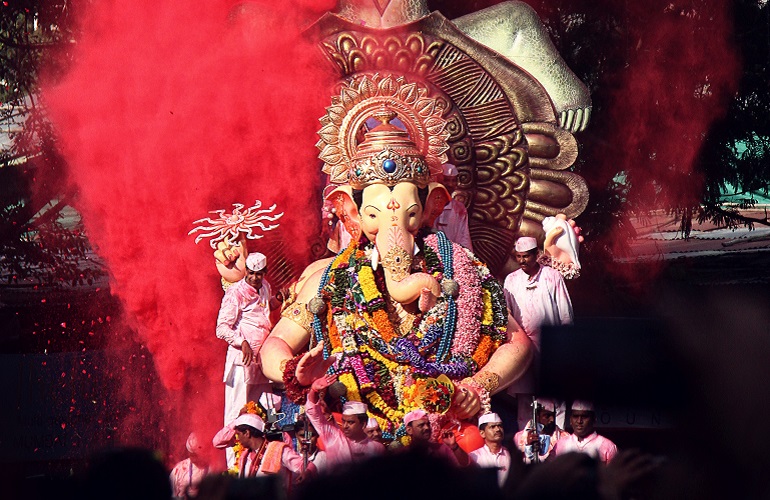“It’s an Indian festival!” the woman shouted at my large, German-American husband, Peter. As she paraded by with the other revelers, she tossed a handful of red dust on us, like confetti. The rosy powder carries with it a symbolic blessing.
Three years ago Peter and I, both ordained Christian pastors, traveled to India to meet our two-year-old son, Abhishek, and bring him home to his siblings. Because our trip coincided with a festival for the Hindu god Ganesh, we spent one of our first days with Abhi watching the religious celebration. Families wove through the streets, carrying their household statues of Ganesh to the nearby river, where they submerged the ceramic idols.
The name of this ritual bath is abhishek. It is, I think, a fitting name for this child of mine, who has since been baptized, submerged, in the Christian faith of a new family.
[“American-Indian, Indian-American”]
Another Layer
Not long after we brought Abhi home, I met the mother of an Indian boy at my older children’s elementary school. Grateful to be making the acquaintance of this woman who shared my child’s heritage, I casually asked, “So, what’s the Indian community like in this area? Where do Indians connect?” I naively expected her to say the Indian market or the movie theater that shows Bollywood films. The answer was unexpected but obvious to her: the temple.
“How would our son learn what it is to be Indian,” I wondered, “while belonging to a family raising him in a faith other than Hinduism?” I did not want Abhi’s adoption to erase essential parts of who he is. At the same time, Peter and I could not imagine raising him in any religion but ours. The two at first seemed inextricable, and the implicit conflict is, in part, why we have not yet made a visit to the temple.
Religion adds another layer to the challenges inherent in any transcultural adoption. We must affirm who our children are, even as they are being transformed into someone else.
A Jewish friend of mine, Barbara, adopted two sons from Paraguay. The boys were born to Roman Catholic birth mothers. As part of their conversion to Judaism, the boys were submerged in a ritual bath called a mikvah.
As Rabbi Michael Gold, an adoptive father, explains, “It represents the child’s being reborn into the Jewish community.” Like Barbara’s sons, Abhishek was immersed at a baptism. Held tightly in the arms of his father, he was plunged underwater and raised, symbolically, to new life. The passage spoken at his baptism was, “This is my son, the beloved, with whom I am well pleased.” I have often repeated these words to my son, and I pray that they will soak into his marrow.
[When Teens Explore Religion as Part of Their Identity]
Should I have baptized my boy? Without a doubt. Should Barbara have taken her boys to the mikvah? Absolutely. A child learns that he belongs to a family as he is embraced by the family’s community of faith.
Faith in Our Family
We must affirm the essential goodness of who Abhi was in his first home and of who he is in his permanent home. Peter and I recognize this bind for our family, and we’re working to find our place in it day by day.
We begin by telling our children that they are altogether acceptable. “You are mine, the beloved, with whom I am well pleased.” Who you are is good. We coo it to them as infants, and we babble it to them as toddlers. We affirm that he, his culture of origin, his ethnicity, his skin, his features are good.
We also try to provide role models who have lived a story like his own. My family is developing a friendship with a Christian couple from India, who attend our church. The wife was raised as a Christian. The husband, raised Hindu, converted to Christianity as a young man. Neither has forsaken their Indian identity. Each knows what it is to be Indian, and each knows what it is to be Christian.
Finally, adoptive families ought to develop relationships with people who share both a child’s birth culture and religion. Such relationships will provide a kind of knowledge that we, as adoptive parents, would be unable to transmit. As we visit with our Indian friends at the park, I recognize how my son is blessed, surrounded by love.
[Expert Audio: Growing Up as a Transracial Adoptee: What Parents Need to Know]
As I see it, adoption and conversion are similar—through each, our people become our children’s people. The challenge before us is to allow our children’s people to become our people, as well.



